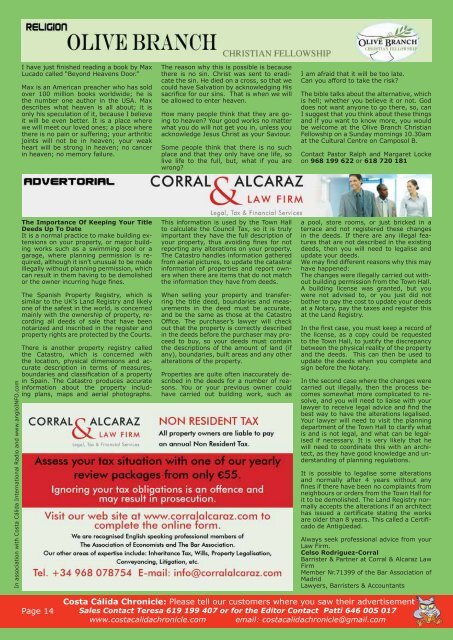august-2014
august-2014
august-2014
Create successful ePaper yourself
Turn your PDF publications into a flip-book with our unique Google optimized e-Paper software.
I have just finished reading a book by Max<br />
Lucado called “Beyond Heavens Door.”<br />
Max is an American preacher who has sold<br />
over 100 million books worldwide; he is<br />
the number one author in the USA. Max<br />
describes what heaven is all about; it is<br />
only his speculation of it, because I believe<br />
it will be even better. It is a place where<br />
we will meet our loved ones; a place where<br />
there is no pain or suffering; your arthritic<br />
joints will not be in heaven; your weak<br />
heart will be strong in heaven; no cancer<br />
in heaven; no memory failure.<br />
The reason why this is possible is because<br />
there is no sin. Christ was sent to eradicate<br />
the sin. He died on a cross, so that we<br />
could have Salvation by acknowledging His<br />
sacrifice for our sins. That is when we will<br />
be allowed to enter heaven.<br />
How many people think that they are going<br />
to heaven? Your good works no matter<br />
what you do will not get you in, unless you<br />
acknowledge Jesus Christ as your Saviour.<br />
Some people think that there is no such<br />
place and that they only have one life, so<br />
live life to the full, but, what if you are<br />
wrong?<br />
I am afraid that it will be too late.<br />
Can you afford to take the risk?<br />
The bible talks about the alternative, which<br />
is hell; whether you believe it or not. God<br />
does not want anyone to go there, so, can<br />
I suggest that you think about these things<br />
and if you want to know more, you would<br />
be welcome at the Olive Branch Christian<br />
Fellowship on a Sunday mornings 10.30am<br />
at the Cultural Centre on Camposol B.<br />
Contact Pastor Ralph and Margaret Locke<br />
on 968 199 622 or 618 720 181<br />
In association with Costa Cálida International Radio and www.angloINFO.com<br />
The Importance Of Keeping Your Title<br />
Deeds Up To Date<br />
It is a normal practice to make building extensions<br />
on your property, or major building<br />
works such as a swimming pool or a<br />
garage, where planning permission is required,<br />
although it isn’t unusual to be made<br />
illegally without planning permission, which<br />
can result in them having to be demolished<br />
or the owner incurring huge fines.<br />
The Spanish Property Registry, which is<br />
similar to the UK’s Land Registry and likely<br />
one of the safest in the world, is concerned<br />
mainly with the ownership of property, recording<br />
all deeds of sale that have been<br />
notarized and inscribed in the register and<br />
property rights are protected by the Courts.<br />
There is another property registry called<br />
the Catastro, which is concerned with<br />
the location, physical dimensions and accurate<br />
description in terms of measures,<br />
boundaries and classification of a property<br />
in Spain. The Catastro produces accurate<br />
information about the property including<br />
plans, maps and aerial photographs.<br />
This information is used by the Town Hall<br />
to calculate the Council Tax, so it is truly<br />
important they have the full description of<br />
your property, thus avoiding fines for not<br />
reporting any alterations on your property.<br />
The Catastro handles information gathered<br />
from aerial pictures, to update the catastral<br />
information of properties and report owners<br />
when there are items that do not match<br />
the information they have from deeds.<br />
When selling your property and transferring<br />
the title deed, boundaries and measurements<br />
in the deed must be accurate,<br />
and be the same as those at the Catastro<br />
Office. The purchaser’s lawyer will check<br />
out that the property is correctly described<br />
in the deeds before the purchaser may proceed<br />
to buy, so your deeds must contain<br />
the descriptions of the amount of land (if<br />
any), boundaries, built areas and any other<br />
alterations of the property.<br />
Properties are quite often inaccurately described<br />
in the deeds for a number of reasons.<br />
You or your previous owner could<br />
have carried out building work, such as<br />
a pool, store rooms, or just bricked in a<br />
terrace and not registered these changes<br />
in the deeds. If there are any illegal features<br />
that are not described in the existing<br />
deeds, then you will need to legalise and<br />
update your deeds.<br />
We may find different reasons why this may<br />
have happened:<br />
The changes were illegally carried out without<br />
building permission from the Town Hall.<br />
A building license was granted, but you<br />
were not advised to, or you just did not<br />
bother to pay the cost to update your deeds<br />
at a Notary, pay the taxes and register this<br />
at the Land Registry.<br />
In the first case, you must keep a record of<br />
the license, as a copy could be requested<br />
to the Town Hall, to justify the discrepancy<br />
between the physical reality of the property<br />
and the deeds. This can then be used to<br />
update the deeds when you complete and<br />
sign before the Notary.<br />
In the second case where the changes were<br />
carried out illegally, then the process becomes<br />
somewhat more complicated to resolve,<br />
and you will need to liaise with your<br />
lawyer to receive legal advice and find the<br />
best way to have the alterations legalised.<br />
Your lawyer will need to visit the planning<br />
department of the Town Hall to clarify what<br />
is and is not legal, and what can be legalised<br />
if necessary. It is very likely that he<br />
will need to coordinate this with an architect,<br />
as they have good knowledge and understanding<br />
of planning regulations.<br />
It is possible to legalise some alterations<br />
and normally after 4 years without any<br />
fines if there have been no complaints from<br />
neighbours or orders from the Town Hall for<br />
it to be demolished. The Land Registry normally<br />
accepts the alterations if an architect<br />
has issued a certificate stating the works<br />
are older than 8 years. This called a Certificado<br />
de Antigüedad.<br />
Always seek professional advice from your<br />
Law Firm.<br />
Celso Rodriguez-Corral<br />
Barrister & Partner at Corral & Alcaraz Law<br />
Firm<br />
Member Nr.71399 of the Bar Association of<br />
Madrid<br />
Lawyers, Barristers & Accountants<br />
Page 14<br />
Costa Cálida Chronicle: Please tell our customers where you saw their advertisement t<br />
Sales Contact Teresa 619 199 407 or for the Editor Contact Patti 646 005 017<br />
www.costacalidachronicle.com email: costacalidachronicle@gmail.com



